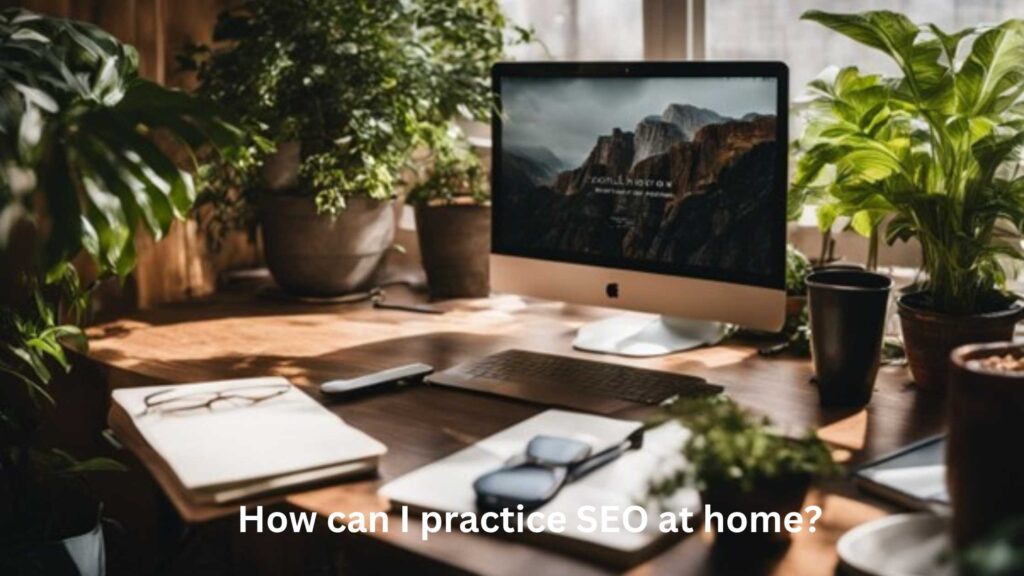
Hitting the first page of Google seems out of reach from your living room couch. But, did you know that 93% of online experiences begin with a search engine? This article will guide you through easy at-home SEO practices to boost your site’s visibility.
Let’s get started!
Understanding SEO and Its Importance
Shifting focus from the basics, we now explore how SEO, or Search Engine Optimization, serves as a cornerstone in achieving online visibility. This process optimizes your website to appear higher in search engine results pages (SERPs), making it easier for potential customers to find you amongst a sea of competitors.
Effective SEO involves tweaking various elements such as keywords, meta descriptions, and backlinks to align with what search engines deem high-quality content.
The power of mastering SEO cannot be overstated. It significantly impacts your site’s visibility, driving more organic traffic without the need for paid advertising. With most people turning to Google or Bing to start their internet journey, being on the first page can mean the difference between a thriving blog or business and one that remains unseen.
Incorporating effective SEO strategies not only enhances your site’s visibility but also builds a strong foundation for long-term success. Partnering with an SEO optimization expert ensures that your content is not just seen, but also resonates with your target audience, driving meaningful engagement and conversions.
Steps to Begin SEO Practice at Home
Interested in improving your website’s visibility on search engines? Discover how to kickstart your SEO practice from the comfort of your living room. Mastering keyword research, understanding on-page and off-page optimization, and crafting SEO-friendly content are essential steps to begin optimizing your site for search engines.
Understanding How SEO Works
SEO is like a digital signpost that guides search engines to your site, boosting its chances of appearing in search results. To truly harness its potential, consider learning about the playful side of optimization through Google certification. This step can empower you to master SEO and unlock new opportunities.
Search engines use complex algorithms to decide which pages rank higher. These algorithms look at many factors on your site, such as keywords, content quality, and how other websites link to yours.
Your goal with SEO is to improve these factors so that crawlers—tools search engines use to browse the web—can easily understand and index your pages. By optimizing elements like HTML tags, improving page load speed, and securing high-quality backlinks from other reputable sites, you can increase your chances of ranking well in search results for relevant queries.
Beyond the basics, SEO is evolving with advancements in technology and search algorithms. Understanding what’s next in the world of search engines is crucial to staying ahead. For a deeper insight into the upcoming trends, explore our article titled Peeking Through the Digital Crystal Ball and see what the future holds!
Mastering Keyword Research
Mastering keyword research starts by identifying the right words customers use to search for products or services online. This step is crucial in SEO and helps your pages get ranked higher on Google.
To do this, you need tools like Moz or free SEO tools that suggest keywords based on popularity and competition. Start with broad terms related to your niche, then narrow down to more specific phrases that match what people are looking for.
Next, analyze these keywords using best practices. Check their search volume, competition level, and relevance to your content. This process ensures you pick queries that not only draw traffic but also match user intent.
Remember, choosing the right keywords can dramatically increase your site’s visibility and click-through-rate by connecting with users’ actual search behaviors.
Learning On-page and Off-page SEO
Transitioning from mastering keyword research to learning on-page and off-page SEO, we continue our journey into the world of search engine optimization. On-page SEO focuses on optimizing individual web pages for higher rankings, including content quality, meta tags, and site structure.
Off-page SEO emphasizes building backlinks and social media presence to boost website authority and credibility. Understanding these two critical aspects of SEO is essential for enhancing digital visibility.
On-page factors like meta descriptions, headings, and image alt texts play a crucial role in improving user experience and search engine crawling. Simultaneously, off-page strategies such as link building and social media engagement contribute to increasing website traffic and establishing an online reputation.
Writing SEO-friendly Content
When creating SEO-friendly content, use relevant keywords strategically. Ensure that your content is informative and engaging, catering to the needs of your target audience. Write clear and concise sentences while maintaining proper grammar and structure.
Incorporate internal and external links to provide value for both readers and search engines.
To further enhance your understanding of writing SEO-friendly content, let’s delve into the nuances of link building.
Beginning Link Building
In link building, you reach out to other websites and get them to link back to your website. This process helps in improving your site’s authority and credibility with search engines.
To start link building, research relevant websites related to your industry. Then, create high-quality content that those sites would want to link back to. After identifying potential sites, craft personalized outreach emails requesting a backlink.
Finally, monitor the responses and follow up as needed.
The quality of links matters more than the quantity, so focus on obtaining links from authoritative and reputable sources rather than just aiming for a high number of links. Also, ensure that the anchor text used for the link contains relevant keywords related to your content or business.
Identifying UX Signals for SEO
Understanding user experience (UX) signals is crucial for effective SEO. Pay close attention to how users interact with your website and the signals they send. Keep an eye on bounce rates, time spent on site, and click-through rates as these indicate whether your website is meeting user needs.
Incorporating easy navigation and intuitive design will keep users engaged and improve UX signals, contributing to better SEO performance. Conducting regular analysis of these signals will guide continuous improvements in both UX and SEO.
Focusing on mobile responsiveness is essential when identifying UX signals for SEO. With a significant portion of online traffic coming from mobile devices, ensuring that your website provides an optimal experience across all screen sizes is paramount.
Prioritize fast loading times, clear call-to-action buttons, and readable content to enhance the overall UX for mobile users – a key factor influencing search engine rankings.
Advancement in SEO Practice
Advance your SEO practice by delving into the realm of digital marketing and exploring how it underpins search engine marketing. Read on to discover more about this exciting topic!
SEO and Digital Marketing
SEO and digital marketing go hand in hand, as a solid understanding of digital marketing is crucial for successful SEO practices. Digital marketing covers a wide range of online strategies, such as social media advertising, content marketing, email campaigns, and more.
By integrating SEO with an effective digital marketing strategy, you can effectively boost your website’s visibility on search engines and enhance your brand’s online presence.
Effective digital marketing also involves leveraging various channels to reach potential customers across the web. This includes creating engaging content across different platforms, optimizing for mobile devices, and utilizing paid advertising tools like Google Ads or social media ads.
SEO Performance Measurement
To measure the performance of your SEO efforts, you should regularly track and analyze key metrics like organic traffic, keyword rankings, and conversion rates. Utilize tools like Google Analytics to monitor website traffic flow and user behavior on-site.
Keep an eye on the number of pages indexed by search engines to ensure that your content is being crawled and recognized for relevant queries. Regularly audit your site’s backlink profile to assess the quality and quantity of inbound links pointing to your website.
Moreover, pay attention to user engagement signals such as bounce rate, time spent on page, and click-through rates. By understanding these metrics in-depth, you can gain valuable insights into how well your SEO strategy is performing and identify areas for improvement.
Utilizing Free SEO Learning Tools and Resources
Explore free SEO learning tools and resources to enhance your expertise. Engage with free online courses from leading platforms like Google Digital Garage, Moz Academy, or SEMrush Academy.
Delve into the complexities of search engine optimization through interactive modules and quizzes that tailor learning towards practical application.
Uncover a wealth of knowledge through comprehensive guides, articles, and videos on reputable websites such as Search Engine Land, Backlinko, and Neil Patel’s blog. These resources provide in-depth insights into diverse topics including keyword research, on-page optimization, link building strategies, and algorithm updates.
Harness the power of free SEO tools such as Google Analytics for performance measurement or AnswerThePublic for query generation. Additionally, leverage website auditing tools like Screaming Frog to identify indexing issues or broken links hindering your pages’ ranking potential.
Conclusion
Unleash Your Website’s Potential: Mastering At-Home SEO Practice
Achieving a high-ranking website isn’t just for big businesses. By understanding and implementing effective SEO strategies at home, you can propel your site to Google’s first page.
From learning keyword research to mastering link building, the power is in your hands. Embrace the journey and watch your online presence soar!

